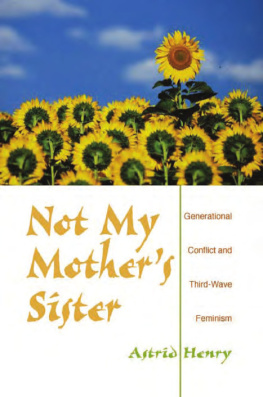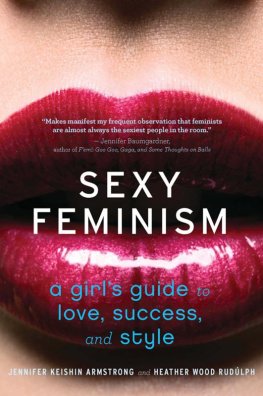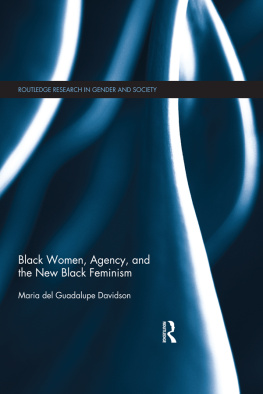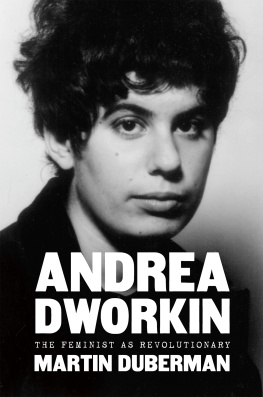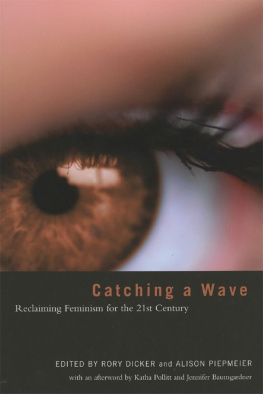
Not My
Mothers
Sister
Not My
Mothers
Sister
Generational Confl ict
and Th
ird-Wave Feminism
Astrid Henry
Indiana University Press
b l o o m i n g t o n a n d i n d i a n a p o l i s Th
is book is a publication of
Indiana University Press
601 North Morton Street
Bloomington, Indiana 47404-3797 USA
http://iupress.indiana.edu
Telephone orders 800-842-6796
Fax orders 812-855-7931
Orders by e-mail iuporder@indiana.edu
2004 by Astrid Henry
All rights reserved
No part of this book may be reproduced or utilized in any form or by any means, electronic or mechanical, including photocopying and recording, or by any information storage and retrieval system, without permission in writing from the publisher. Th
e Association of American University Presses
Resolution on Permissions constitutes the only exception to this prohibition.
Th
e paper used in this publication meets the minimum requirements of American National Standard for Information SciencesPermanence of Paper for Printed Library Materials, ANSI Z39.48-1984.
Manufactured in the United States of America
Library of Congress Cataloging-in-Publication Data Henry, Astrid, date
Not my mothers sister : generational confl ict and third-wave feminism / Astrid Henry.
p. cm.
Includes bibliographical references and index.
ISBN 0-253-34454-9 (cloth : alk. paper) ISBN 0-253-21713-X (pbk. : alk. paper) 1. FeminismUnited States. 2. Feminist theoryUnited States. 3. Lesbian feminist theoryUnited States. 4. African American women. I. Title.
HQ1421.H43 2004
305.420973dc22
2003027304
1 2 3 4 5 09 08 07 06 05 04
To my father
for teaching me how to live feminism
and
To Jane
for teaching me how to write it
Contents
Acknowledgments | ix
Introduction | 1
One Daughterhood Is Powerful | 16
t h e e m e r g e n c e o f f e m i n i s m s t h i r d w a v e Two Finding Ourselves in the Past | 52
f e m i n i s t g e n e r a t i o n s a n d t h e d e v e l o p m e n t o f s e c o n d - w a v e f e m i n i s m Three Taking Feminism to Bed | 88
t h e t h i r d w a v e d o e s t h e s e x w a r s Four Neither My Mother nor My Lover | 115
g e n e r a t i o n a l r e l a t i o n s i n q u e e r f e m i n i s m Five To Be, or Not to Be, Real | 148
b l a c k f e m i n i s t s a n d t h e
e m e r g i n g t h i r d w a v e
Afterword | 181
Notes | 185
Bibliography | 237
Index | 265
Acknowledgments
I am very grateful to the many people who have supported me throughout the long process of writing this book. Th
is project originated as a dis
sertation in the Modern Studies Program of the English Department at the University of WisconsinMilwaukee. I am indebted to Jane Gallop for our many conversationsintellectual, political, and personalover the last decade. As my dissertation director, Jane never wavered in her belief in me and in this project, even as she consistently pushed me to make the work better. I am so grateful to Jane for our friendship and for teaching me both the hard work and great pleasure in writing. I would also like to thank the other members of my dissertation committee, Lynne Joyrich and Kathy Woodward. Th
eir insightful reading of my
work has been invaluable, and I have learned much from them and our conversations. Th
anks also to Gwynne Kennedy and Sylvia Schafer for their many helpful ideas and suggestions.
While at UWM I was part of a community of graduate students to whom I owe an enormous debt for their support and critical readings of my work. In particular, I would like to thank Karen Boren, Eric Hayot, Jeff King, Christie Launius, and Jennifer Maher. I also want to thank the many teachers and mentors who helped me to become a feminist scholar, especially Nancy Baker, Jessica Benjamin, Susan Burgess, Greg Jay, Angel Moger, and Sara Ruddick. I owe special thanks to Shahnaz Rouse of Sarah Lawrence College. Being Shahnazs student remains one of the most important experiences of my life, and I am forever changed by her inspiring example. I also want to thank my many won-derful students throughout the years, particularly the students in my courses on third-wave feminism and feminist generations at Saint Marys College, Grinnell College, and the University of WisconsinMilwaukee.
You are the reason why I love what I do.
I am indebted to my editor, Kate Babbitt, for her incisive reading of the manuscript. Her comments and questions were extremely helpful ix
A c k n o w l e d g m e n t s
in making the fi nal revisions. Susan Fraiman and the two anonymous readers of the manuscript also contributed many useful insights into my project. All errors and oversights are, of course, entirely my own. Th anks
also to Tony Brewer, Jane Lyle, and Robert Sloan at Indiana University Press for all their help.
For their support and championing of my work, I would like to thank Jennifer Baumgardner, Rory Dicker, Paula Kamen, Andrea OReilly, Alison Piepmeir, and Jo Reger. I have received much support from my colleagues at Saint Marys College over the last few years, and I would especially like to thank Ann Clark and Phyllis Kaminski for their encouragement of my work. I would also like to thank my friends for seeing me through this long process. In particular, I thank Nicole Bates, Jimmy Cox, Nina DeYoung, Dianna Diers, Joe Eisman, Malinda Foy, Cricket Keating, Amy ONeill, Mary Porter, Mariah Schroeder, and Jennifer Zachman. Th
anks also to the women of my meditation
groupTh
eresa Priebe, Linda Reid, and Cookie Werbelfor their support and wisdom.
Some of the ideas included in chapter 1 were fi rst worked through in Biting the Hand that Feeds You: Feminism as the Bad Mother, in Mothers and Daughters: Connection, Empowerment, and Transformation, edited by Andrea OReilly and Sharon Abbey (Boston: Rowman
& Littlefi eld Publishers, 2000), 213224. Sections of the introduction, chapter 1, and chapter 5 appeared in an earlier form as Feminisms Family Problem: Feminist Generations and the Mother-Daughter Trope,
Catching a Wave: Reclaiming Feminism for the 21st Century, edited by Rory Dicker and Alison Piepmeir (Boston: Northeastern University Press, 2003), 209231.
My family has been a constant source of love, support, and encouragement throughout the process of writing this book. I want to thank my cousin, Anja Laub Methling, for her compassionate heart and great insight into family dynamics. I thank my brother, Axel Henry, for helping me to appreciate that diff erences are inherent to families.
I could not have fi nished this project without the support of my sister, Else Henry, whose faith in my abilities never wavers. As have many of my generation, I learned about feminism as a child, from parents whose family values were feminist. I want to thank my mother, Meser Henry, for our friendship and for helping me to understand the complexities of x
A c k n o w l e d g m e n t s
the mother-daughter relationship. I am indebted to my father, Harley Henry, for his enthusiastic championing of my scholarship and for his unconditional love and support. Finally, I am profoundly grateful to David Harrison for his love, understanding, and sense of humor, not to mention his dedication to this book and its ideas. His insightful criticism of all the many drafts proved invaluable to the books completion.
Next page
